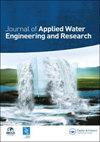热带绿化屋顶基质和植被的适宜性
IF 1.6
Q4 WATER RESOURCES
Journal of Applied Water Engineering and Research
Pub Date : 2023-10-09
DOI:10.1080/23249676.2023.2261368
引用次数: 0
摘要
摘要本研究在屋顶坡度为16.7°的条件下,研究了表土、60%表土与40%生物炭混合、60%表土与40%鸡粪混合3种基质类型的绿色屋顶的饱和容重和保水效率。基底厚度为35毫米,由木材绿色屋顶原型支撑,屋顶上有结缕草、当地牛草和9点钟花作为植被。在降雨10 mm、持续20 min的条件下,植被保水效率分别为50.3%(结缕草)、49.3%(当地牛草)和57.4%(9点钟花)。在此基础上,建议在热带气候条件下使用表土和椰泥复合基质的9点钟花作为绿色屋顶的保水效率。披露声明作者未报告潜在的利益冲突。本文章由计算机程序翻译,如有差异,请以英文原文为准。
Suitability of substrate and vegetation for tropical green roofs
AbstractThis study investigates the performance of green roofs with three different types of substrate, which are topsoil, a mix of 60% topsoil and 40% biochar, and a mix of 60% topsoil and 40% cocopeat in terms of saturated bulk density and water retention efficiency with a roof slope of 16.7°. The substrate has a thickness of 35 mm and was supported by a timber green roof prototype with Zoysia Japonica, Local cow grass and 9 o’clock flower as vegetation. It was also observed from the experiment that with respect to vegetation, the water retention efficiency is 50.3% (Zoysia Japonica), 49.3% (Local cow grass), and 57.4% (9 o’clock flower) with topsoil and cocopeat for a rainfall of 10 mm for a period of 20 min. Based on this research, a 9 o’clock flower with substrate combining topsoil and coco peat is recommended for green roofs in tropical climates. Disclosure statementNo potential conflict of interest was reported by the authors.
求助全文
通过发布文献求助,成功后即可免费获取论文全文。
去求助
来源期刊

Journal of Applied Water Engineering and Research
WATER RESOURCES-
CiteScore
2.90
自引率
16.70%
发文量
31
期刊介绍:
JAWER’s paradigm-changing (online only) articles provide directly applicable solutions to water engineering problems within the whole hydrosphere (rivers, lakes groundwater, estuaries, coastal and marine waters) covering areas such as: integrated water resources management and catchment hydraulics hydraulic machinery and structures hydraulics applied to water supply, treatment and drainage systems (including outfalls) water quality, security and governance in an engineering context environmental monitoring maritime hydraulics ecohydraulics flood risk modelling and management water related hazards desalination and re-use.
 求助内容:
求助内容: 应助结果提醒方式:
应助结果提醒方式:


